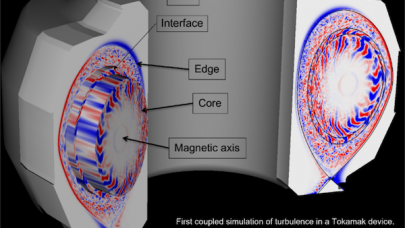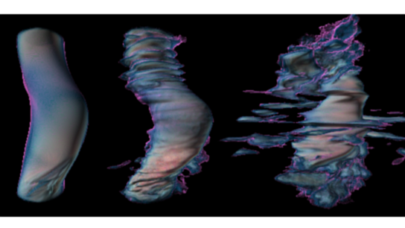
Using Exascale Supercomputers to Make Clean Fusion Energy Possible
September 2, 2022
Fusion, the nuclear reaction that powers the Sun and the stars, has incredible potential as a source of safe, carbon-free and essentially limitless energy. But Read more…

Fusion Plasma Simulation Software Couples Tokamak Core to Edge Physics
July 15, 2022
The development of a whole device model (WDM) for a fusion reactor is critical for the science of magnetically confined fusion plasmas. In the next decade, the Read more…

Supercomputer-Powered Machine Learning Supports Fusion Energy Reactor Design
February 25, 2021
Energy researchers have been reaching for the stars for decades in their attempt to artificially recreate a stable fusion energy reactor. If successful, such a Read more…

Supercomputer-Powered AI Tackles a Key Fusion Energy Challenge
August 7, 2019
Fusion energy is the Holy Grail of the energy world: low-radioactivity, low-waste, zero-carbon, high-output nuclear power that can run on hydrogen or lithium. T Read more…

Supercomputing Propels Fusion Science
September 29, 2014
University of Texas at Austin physicist Wendell Horton has been using the resources of the Texas Advanced Computing Center (TACC) to study the full 3D structure Read more…

Supercomputing Energy Use Getting a Bad Rap
September 24, 2010
Power consumption of big supercomputers not that outrageous. Read more…

- Click Here for More Headlines

Whitepaper
Transforming Industrial and Automotive Manufacturing
In this era, expansion in digital infrastructure capacity is inevitable. Parallel to this, climate change consciousness is also rising, making sustainability a mandatory part of the organization’s functioning. As computing workloads such as AI and HPC continue to surge, so does the energy consumption, posing environmental woes. IT departments within organizations have a crucial role in combating this challenge. They can significantly drive sustainable practices by influencing newer technologies and process adoption that aid in mitigating the effects of climate change.
While buying more sustainable IT solutions is an option, partnering with IT solutions providers, such and Lenovo and Intel, who are committed to sustainability and aiding customers in executing sustainability strategies is likely to be more impactful.
Learn how Lenovo and Intel, through their partnership, are strongly positioned to address this need with their innovations driving energy efficiency and environmental stewardship.
Download Now
Sponsored by Lenovo
Whitepaper
How Direct Liquid Cooling Improves Data Center Energy Efficiency
Data centers are experiencing increasing power consumption, space constraints and cooling demands due to the unprecedented computing power required by today’s chips and servers. HVAC cooling systems consume approximately 40% of a data center’s electricity. These systems traditionally use air conditioning, air handling and fans to cool the data center facility and IT equipment, ultimately resulting in high energy consumption and high carbon emissions. Data centers are moving to direct liquid cooled (DLC) systems to improve cooling efficiency thus lowering their PUE, operating expenses (OPEX) and carbon footprint.
This paper describes how CoolIT Systems (CoolIT) meets the need for improved energy efficiency in data centers and includes case studies that show how CoolIT’s DLC solutions improve energy efficiency, increase rack density, lower OPEX, and enable sustainability programs. CoolIT is the global market and innovation leader in scalable DLC solutions for the world’s most demanding computing environments. CoolIT’s end-to-end solutions meet the rising demand in cooling and the rising demand for energy efficiency.
Download Now
Sponsored by CoolIT
Advanced Scale Career Development & Workforce Enhancement Center
Featured Advanced Scale Jobs:
HPCwire Resource Library
HPCwire Product Showcase
© 2024 HPCwire. All Rights Reserved. A Tabor Communications Publication
HPCwire is a registered trademark of Tabor Communications, Inc. Use of this site is governed by our Terms of Use and Privacy Policy.
Reproduction in whole or in part in any form or medium without express written permission of Tabor Communications, Inc. is prohibited.
























